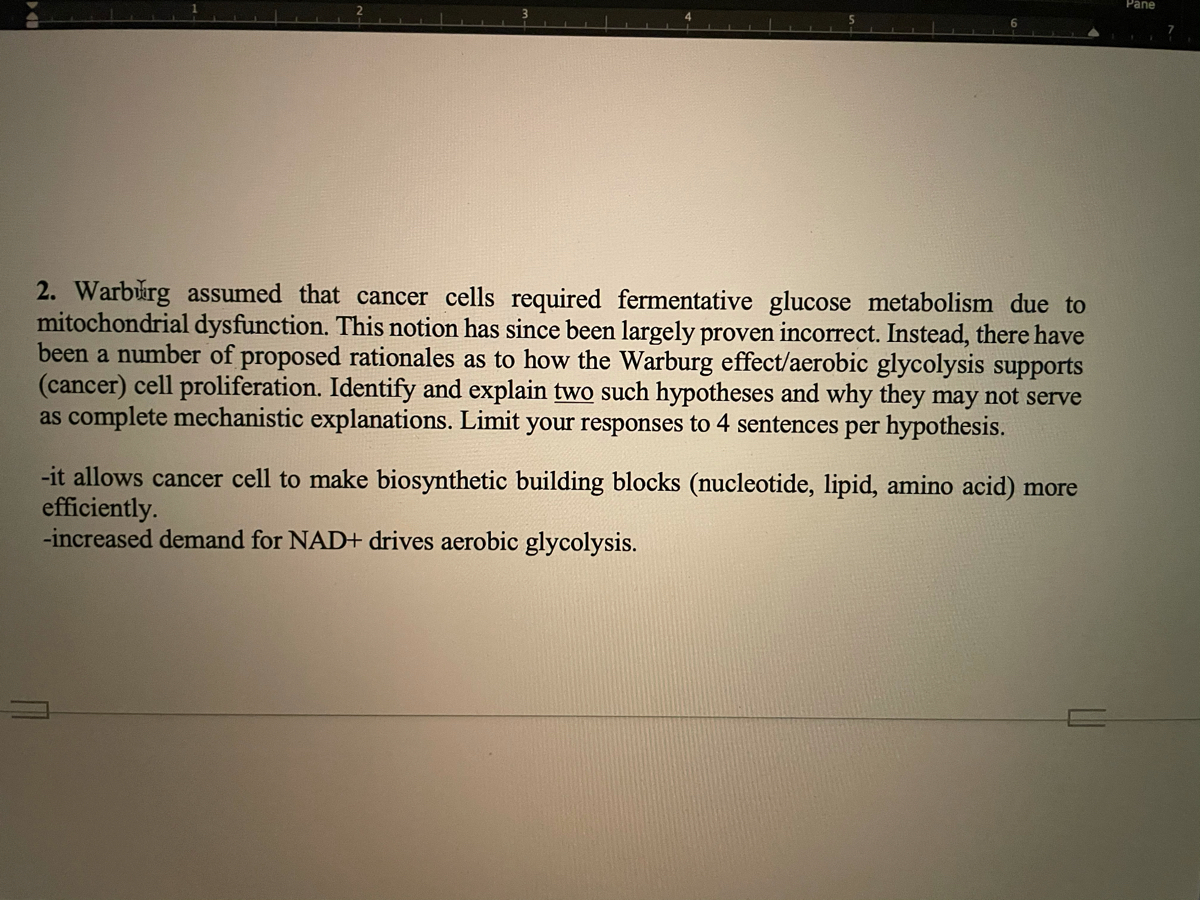2. Warburg assumed that cancer cells required fermentative glucose metabolism due to mitochondrial dysfunction. This notion has since been largely proven incorrect. Instead, there have been a number of proposed rationales as to how the Warburg effect/aerobic glycolysis supports (cancer) cell proliferation. Identify and explain two such hypotheses and why they may not serve as complete mechanistic explanations. Limit your responses to 4 sentences per hypothesis. -it allows cancer cell to make biosynthetic building blocks (nucleotide, lipid, amino acid) more efficiently. -increased demand for NAD+ drives aerobic glycolysis.
2. Warburg assumed that cancer cells required fermentative glucose metabolism due to mitochondrial dysfunction. This notion has since been largely proven incorrect. Instead, there have been a number of proposed rationales as to how the Warburg effect/aerobic glycolysis supports (cancer) cell proliferation. Identify and explain two such hypotheses and why they may not serve as complete mechanistic explanations. Limit your responses to 4 sentences per hypothesis. -it allows cancer cell to make biosynthetic building blocks (nucleotide, lipid, amino acid) more efficiently. -increased demand for NAD+ drives aerobic glycolysis.
Biochemistry
9th Edition
ISBN:9781319114671
Author:Lubert Stryer, Jeremy M. Berg, John L. Tymoczko, Gregory J. Gatto Jr.
Publisher:Lubert Stryer, Jeremy M. Berg, John L. Tymoczko, Gregory J. Gatto Jr.
Chapter1: Biochemistry: An Evolving Science
Section: Chapter Questions
Problem 1P
Related questions
Question
100%
Do you know the limit of two hypothesis???

Transcribed Image Text:Pane
2. Warburg assumed that cancer cells required fermentative glucose metabolism due to
mitochondrial dysfunction. This notion has since been largely proven incorrect. Instead, there have
been a number of proposed rationales as to how the Warburg effect/aerobic glycolysis supports
(cancer) cell proliferation. Identify and explain two such hypotheses and why they may not serve
as complete mechanistic explanations. Limit your responses to 4 sentences per hypothesis.
-it allows cancer cell to make biosynthetic building blocks (nucleotide, lipid, amino acid) more
efficiently.
-increased demand for NAD+ drives aerobic glycolysis.
Expert Solution
Step 1

Step by step
Solved in 2 steps with 1 images

Knowledge Booster
Learn more about
Need a deep-dive on the concept behind this application? Look no further. Learn more about this topic, biochemistry and related others by exploring similar questions and additional content below.Recommended textbooks for you

Biochemistry
Biochemistry
ISBN:
9781319114671
Author:
Lubert Stryer, Jeremy M. Berg, John L. Tymoczko, Gregory J. Gatto Jr.
Publisher:
W. H. Freeman

Lehninger Principles of Biochemistry
Biochemistry
ISBN:
9781464126116
Author:
David L. Nelson, Michael M. Cox
Publisher:
W. H. Freeman

Fundamentals of Biochemistry: Life at the Molecul…
Biochemistry
ISBN:
9781118918401
Author:
Donald Voet, Judith G. Voet, Charlotte W. Pratt
Publisher:
WILEY

Biochemistry
Biochemistry
ISBN:
9781319114671
Author:
Lubert Stryer, Jeremy M. Berg, John L. Tymoczko, Gregory J. Gatto Jr.
Publisher:
W. H. Freeman

Lehninger Principles of Biochemistry
Biochemistry
ISBN:
9781464126116
Author:
David L. Nelson, Michael M. Cox
Publisher:
W. H. Freeman

Fundamentals of Biochemistry: Life at the Molecul…
Biochemistry
ISBN:
9781118918401
Author:
Donald Voet, Judith G. Voet, Charlotte W. Pratt
Publisher:
WILEY

Biochemistry
Biochemistry
ISBN:
9781305961135
Author:
Mary K. Campbell, Shawn O. Farrell, Owen M. McDougal
Publisher:
Cengage Learning

Biochemistry
Biochemistry
ISBN:
9781305577206
Author:
Reginald H. Garrett, Charles M. Grisham
Publisher:
Cengage Learning

Fundamentals of General, Organic, and Biological …
Biochemistry
ISBN:
9780134015187
Author:
John E. McMurry, David S. Ballantine, Carl A. Hoeger, Virginia E. Peterson
Publisher:
PEARSON